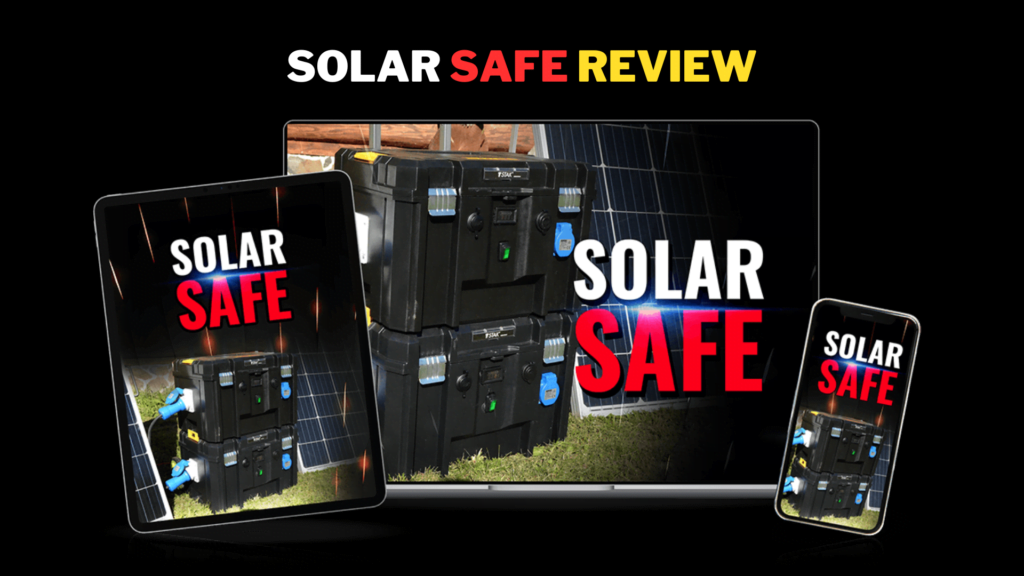Thinking about going solar? Solar Safe is a popular option, but is it the right choice for you? This comprehensive Solar Safe review will dive into the device’s pros, cons, pricing, and whether it lives up to the hype.

Table of Contents
ToggleWhat is Solar Safe?
Solar Safe typically refers to products or practices that ensure safety and protection in the context of solar energy usage. This can encompass various aspects:
➡️ Solar Safe Products: These are solar panels, inverters, batteries, and related equipment that are designed and certified to meet safety standards. They often include features such as overcurrent protection, insulation, and grounding to prevent electrical hazards.
➡️ Solar Safe Installation: Refers to the proper and secure installation of solar panels and related components to ensure structural integrity and electrical safety. This includes following building codes, using appropriate mounting hardware, and conducting electrical work safely.
➡️ Solar Safe Practices: Encompasses guidelines and procedures for handling solar equipment safely, such as disconnecting power before maintenance, using personal protective equipment (PPE), and following manufacturer instructions for maintenance and repairs.
Overall, Solar Safe signifies the importance of implementing safety measures and using reliable equipment to harness solar energy efficiently while minimizing risks to people and property.
How does Solar Safe Work?
✅ General Solar Power Systems: In this case, the working principle applies to most residential solar setups. Here’s a breakdown:
✅ Capturing Sunlight: Solar panels are made up of photovoltaic (PV) cells. At the point when daylight hits these cells, it energizes electrons inside the material, making an immediate flow (DC) power stream.
✅ Conversion to Usable Power: The DC electricity generated by the panels isn’t directly compatible with your home’s appliances. This is where the inverter comes in. It converts the DC electricity from the panels into alternating current (AC) electricity, which is the standard type of electricity used in homes.
✅ Power Usage and Storage (Optional): The converted AC electricity from the inverter can then be used to power your home’s appliances during daylight hours. If your system includes a battery backup, any excess energy produced by the panels can be stored in the batteries for later use. This allows you to utilize solar power even when there’s no sunlight, like at night or during cloudy days.
✅ Specific Solar Safe Product: If “Solar Safe” refers to a particular brand’s product, the working principle might differ depending on its specific function. Without more information about that product, we can’t provide details on its specific operation.

What can be learned from Solar Safe?
Renewable Energy Technology:
👉 Photovoltaic (PV) Cells: You’ll gain a deeper understanding of how sunlight is converted into electricity using photovoltaic cells.
👉 Solar Energy Potential: By monitoring your system’s performance, you’ll learn about the potential of solar energy generation in your specific location.
👉 Energy Consumption Habits: Tracking your energy use can help you identify areas for potential reduction and optimize your solar power usage.
Sustainability and Environmental Impact:
👉 Reduced Carbon Footprint: By generating clean solar energy, you’ll directly contribute to reducing your reliance on fossil fuels and your overall carbon footprint.
👉 Sustainable Living Practices: Solar power systems encourage a more sustainable approach to energy consumption, promoting environmentally conscious living.
Home Energy Management:
👉 Energy Independence: Solar power with battery backup can provide a degree of energy independence, making you less reliant on the traditional power grid.
👉 Smart Energy Consumption: Learning to maximize solar power usage and potentially integrate it with smart home technologies can help you optimize your home’s energy efficiency.
👉 Cost Savings Potential: Monitoring your system’s output and energy bill reduction can provide valuable insights into the long-term cost-saving potential of solar power.
Technology and Innovation:
👉 Advancements in Solar Technology: As you learn about your solar system, you’ll gain exposure to advancements in solar technology and how it can contribute to a cleaner energy future.
👉 Home Integration of Renewables: Solar power systems showcase how renewable energy sources can be seamlessly integrated into existing home energy infrastructure.
Pros and Cons of Solar Safe
Pros of Solar Safe:
➡️ Safety: Solar Safe practices and products prioritize safety, reducing the risk of electrical hazards and accidents during installation, maintenance, and operation.
➡️ Protection of Equipment: Solar Safe components and installation techniques help protect solar panels, inverters, and batteries from damage, extending their lifespan and improving overall system performance.
➡️ Compliance: Adhering to Solar Safe standards ensures compliance with building codes and regulations, providing peace of mind and legal compliance for homeowners and businesses.
➡️ Environmental Benefits: Solar energy is a clean and renewable source of power, contributing to reduced carbon emissions and environmental impact compared to traditional energy sources.
➡️ Energy Independence: Solar Safe systems enable individuals and businesses to generate their own electricity, reducing reliance on grid power and providing energy independence.
Cons of Solar Safe:
✔️ Initial Cost: The upfront cost of Solar Safe equipment and installation may be higher compared to conventional energy systems, although long-term savings often offset this initial investment.
✔️ Weather Dependency: Solar energy production can be affected by weather conditions, such as cloud cover or low sunlight hours, leading to fluctuations in energy generation.
✔️ Space Requirement: Installing solar panels typically requires adequate roof or ground space, which may not be feasible for all properties or locations.

Benefits of Solar Safe
- Reduced Electricity Bills: Solar panels generate clean electricity, offsetting your reliance on the traditional power grid and potentially leading to significant savings on your electricity bills.
- Increased Home Value: Homes with solar power systems are often viewed as more desirable and can sell faster and for a higher price compared to non-solar homes.
- Reduced Water Usage: Solar power generation doesn’t require large amounts of water unlike some traditional electricity generation methods.
- Long-Term Investment: While the initial investment for solar panels can be high, they are built to last for decades. Over time, the electricity cost savings can outweigh the initial cost, making solar power a sound long-term investment.
Solar Safe Cost & Refund Policy:
The cost of Solar Safe is $39.00, offering exceptional value for safety and protection in solar energy usage. Additionally, Solar Safe provides a generous 60-day money-back guarantee.
If for any reason you are not completely satisfied with Solar Safe within 60 days of purchase, you can request a full refund, no questions asked.
This refund policy ensures that your investment in Solar Safe is risk-free and provides peace of mind regarding your solar energy safety needs.

Conclusion:
Solar power systems, often referred to as “Solar Safe” for general understanding, offer a multitude of benefits for homeowners. These benefits include reducing electricity bills and dependence on fossil fuels, potentially increasing home value, and achieving a degree of energy independence with battery backup.
While the initial cost can be high, government incentives and long-term electricity cost savings can make solar power a worthwhile investment for an environmentally friendly and potentially cost-saving future.
Disclaimer: This article is for informational purposes only and does not constitute financial or investment advice. It is advisable to conduct thorough research and exercise caution before making any financial decisions.
Affiliate Disclosure: This product review contains links that may earn us a small commission if you choose to purchase the recommended product, with no extra cost to you. This commission contributes to supporting our research and editorial team. Rest assured that we only recommend products of high quality.
